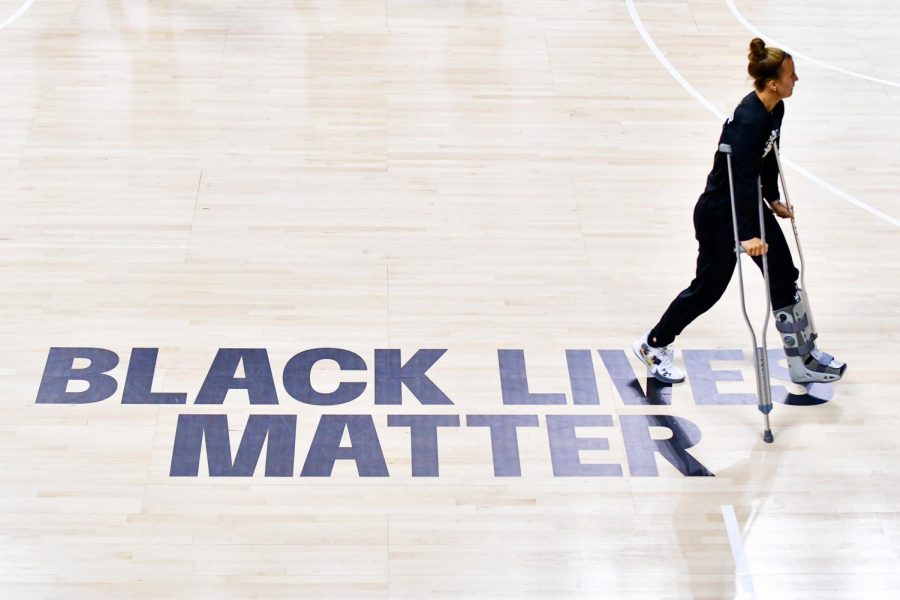Column | WNBA players lead renewed push for empowered athletes
Julio Aguilar, Getty Images | TNS
Sabrina Ionescu of the New York Liberty walks across the court during halftime of a game against the Phoenix Mercury on Aug. 2.
October 27, 2020
July 2020 marked two months since the killing of George Floyd, four months since the killing of Breonna Taylor and the start of one of the most controversial professional sports seasons in recent history.
The WNBA announced July 6 it was calling this season “The Justice Movement” and formed a Social Justice Council within the league to promote social justice issues surrounding race, voting rights, LGBTQ+ advocacy and gun control. The council’s goal is to “educate, amplify and mobilize for action” by promoting space for community conversations, player podcasts and virtual roundtables.
This council was not the first time the WNBA has protested the killing of Black people by police. Players from the Minnesota Lynx held a news conference prior to a July 2016 game to discuss the killing of Philando Castile due to police violence. Players displayed Castile’s name, along with Alton Sterling, a Black man killed by police in Louisiana, on the backs of their shirts.
At the time, in 2016, there was no formal declaration of the league’s stance on any social issues, but other teams and players began to follow and express support for the Lynx’s protest. Every member of the Indiana Fever linked arms and knelt during the national anthem during the team’s first game in the 2016 playoffs.
Marissa Coleman, a Fever player, said the entire team made the decision to kneel.
“It was unanimous that we were going to do it together,” Coleman said. “We have a platform, and I think it’s a disservice if we don’t use it. This was bigger than basketball. As important as this game was, there are other things going on in this world. It’s just to get conversations started.”
Those conversations were the foundation of a movement constantly present during the 2020 season. The WNBA continually made clear that sports are — and should be — political.
The WNBA had more to lose by taking a political stance than any other professional sports league, due to the accepted lackluster coverage of women’s sports in the media — only 4% of all sports media coverage is of women’s athletics. These players do not have the same financial backing or fanbase as their professional male counterparts.
But that hasn’t been a deterrent, according to Elizabeth Williams of the Atlanta Dream.
”We’ve been doing this work, regardless of how much visibility we’ve had,” Williams said.
The players focused their efforts on bringing awareness to how the players represented themselves on the court this season. Teams wore uniforms with Taylor’s name as a way to show solidarity for Black women who have fallen victim to police brutality. WNBA teams also wore Nike-sponsored warmups stating “Black Lives Matter,” and took it so far as to decal the phrase onto their courts.
After the shooting of Jacob Blake by police in Kenosha, Wisconsin, in August, Williams announced following the lead of their “brothers in the NBA” that they would not play the games slated for that Wednesday and the following Thursday in an effort to keep attention on Blake. Nneka Ogwumike took the role to read a statement from the players, which clearly established that they were not boycotting or striking — they were taking a day to reflect and take “informed action and mobilization.”
While the WNBA has stood strong in its statements, the athletes still face individuals and organizations trying to quiet their voices.
Sen. Kelly Loeffler, R-Ga., was one of the loudest protestors to the league’s political decisions.
“@WNBA should stand for and unite around the American Flag — not divisive political movements like BLM that unapologetically seek to defund the police,” Loeffler tweeted.
Leoffler was once a co-owner of the WNBA franchise Atlanta Dream, but stepped down in October 2019.
The Dream relentlessly kept their same values and loyalty to BLM despite Loeffler’s interference and her position of power within the organization. This is a testament to the WNBA’s no-matter-the-cost mentality when it comes to standing for what players believe in.
Sports cannot be apolitical when professional leagues such as the NBA and WNBA have teams made up largely of Black people — about 80% and 70%, respectively. When the players that make up the majority of a professional sports league are subject to systemic racism and discrimination, they have every right to support that movement in both their personal and professional lives.
Cheryl Reeve, head coach of the Minnesota Lynx, read a statement the day her team knelt during the national anthem in solidarity for Black lives. In it, she tosses basketball to the wayside and reaffirms the athlete’s place in American politics.
“I am proud of this generation of women in the WNBA who don’t fear people who want to take this away from us and say, ‘You spoke up too much, we’re going to take your league away from you,’” Reeve said. “We’re unafraid of that.”



